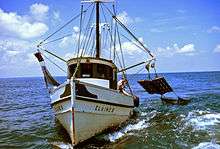World fisheries production
Global production of aquatic organisms in million tonnes, since 1950, as reported by the FAO
[1]The global commercial production for human use of fish and other aquatic organisms occurs in two ways: they are either captured wild by commercial fishing or they are cultivated and harvested using aquacultural and farming techniques.
According to the Food and Agriculture Organization (FAO), the world production in 2005 consisted of 93.2 million tonnes captured by commercial fishing in wild fisheries, plus 48.1 million tonnes produced by fish farms. In addition, 1.3 million tons of aquatic plants (seaweed etc.) were captured in wild fisheries and 14.8 million tons were produced by aquaculture.[2] The number of individual fish caught in the wild has been estimated at 0.97-2.7 trillion per year (not counting fish farms or marine invertebrates).[3]
Marine and inland fisheries
| World capture production 2007 in thousands of tonnes[4] |
| |
Inland fisheries |
Marine fisheries |
Totals |
| Freshwater fish |
 |
8,695 |
23 |
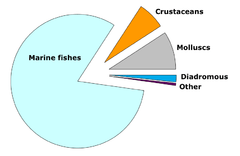 |
8,718 |
| Diadromous fish |
341 |
1,444 |
1,785 |
| Marine fishes |
82 |
65,627 |
65,709 |
| Crustaceans |
474 |
5,367 |
5,840 |
| Molluscs |
383 |
7,182 |
7,564 |
| Other |
61 |
388 |
449 |
| Totals |
10,035 |
80,029 |
90,064 |
Capture production by species
The following table shows the capture production by groups of species (fish, crustaceans, molluscs, etc.) in tonnes.
| Capture production by groups of species in tonnes |
| Type |
Group |
1999 |
2000 |
2001 |
2002 |
2003 |
2004 |
2005 |
| freshwater fish |
Carps, barbels and other cyprinids |
616,828 |
574 405 |
569 934 |
616 985 |
624 333 |
594 392 |
648 160 |
| freshwater fish |
Tilapias and other cichlids |
636,758 |
680 004 |
678 157 |
662 276 |
689 661 |
754 395 |
753 372 |
| freshwater fish |
Miscellaneous freshwater fishes |
5,592,329 |
5 634 005 |
5 733 341 |
5 400 530 |
6 234 448 |
6 277 565 |
6 797 864 |
| finfish |
Sturgeons, paddlefishes |
2,851 |
2 603 |
2 313 |
1 908 |
1 628 |
1 450 |
1 333 |
| freshwater fish |
River eels |
11,939 |
16 138 |
12 374 |
11 444 |
10 516 |
10 746 |
10 463 |
| finfish |
Salmons, trouts, smelts |
913,327 |
805 154 |
891 042 |
809 873 |
966 097 |
880 261 |
1 031 141 |
| migratory fish |
Shads |
788,770 |
860 346 |
665 284 |
589 692 |
524 800 |
569 160 |
605 548 |
| finfish |
Miscellaneous migratory fishes |
75,921 |
83 328 |
75 650 |
79 538 |
79 465 |
68 077 |
65 817 |
| demersal fish |
Flounders, halibuts, soles |
956,926 |
1 009 253 |
948 427 |
915 177 |
917 326 |
862 162 |
900 012 |
| finfish |
Cods, hakes, haddocks |
9,431,141 |
8 695 910 |
9 304 922 |
8 474 044 |
9 385 328 |
9 398 780 |
8 964 873 |
| finfish |
Miscellaneous coastal fishes |
6,119,412 |
6 112 189 |
6 310 904 |
6 315 752 |
6 789 732 |
7 002 006 |
6 640 784 |
| demersal fish |
Miscellaneous demersal fishes |
2,955,849 |
3 033 384 |
3 008 283 |
3 062 222 |
3 059 707 |
3 163 050 |
2 986 081 |
| pelagic fish |
Herrings, sardines, anchovies |
22,671,427 |
24 919 239 |
20 640 734 |
22 289 332 |
18 840 389 |
23 047 541 |
22 404 769 |
| pelagic fish |
Tunas, bonitos, billfishes |
5,943,593 |
5 816 647 |
5 782 841 |
6 138 999 |
6 197 087 |
6 160 868 |
6 243 122 |
| pelagic fish |
Miscellaneous pelagic fishes |
10,712,994 |
10 654 041 |
12 332 170 |
11 772 320 |
11 525 390 |
11 181 871 |
11 179 641 |
| sharks etc. |
Sharks, rays, chimaeras |
858,007 |
870 455 |
845 854 |
845 820 |
880 785 |
819 012 |
771 105 |
| other fish |
Marine fishes not identified |
10,721,534 |
10 736 398 |
10 599 122 |
10 513 550 |
9 714 669 |
9 747 625 |
9 565 512 |
| crustacean |
Freshwater crustaceans |
494,111 |
563 641 |
626 407 |
816 405 |
366 117 |
353 446 |
391 526 |
| crustacean |
Crabs, sea spiders |
1,061,042 |
1 101 880 |
1 093 256 |
1 122 414 |
1 334 001 |
1 332 932 |
1 323 616 |
| crustacean |
Lobsters, spiny rock lobsters |
229,179 |
227 950 |
222 138 |
225 646 |
225 793 |
233 825 |
231 233 |
| crustacean |
King crabs, squat lobsters |
77,644 |
67 932 |
46 382 |
41 853 |
43 993 |
36 457 |
52 064 |
| crustacean |
Shrimps, prawns |
3,028,171 |
3 089 755 |
2 957 730 |
2 969 311 |
3 545 309 |
3 542 438 |
3 416 533 |
| crustacean |
Krill, planktonic crustaceans |
101,957 |
114 425 |
104 216 |
125 989 |
117 981 |
118 164 |
127 034 |
| crustacean |
Miscellaneous marine crustaceans |
1,293,164 |
1 372 858 |
1 427 312 |
1 359 158 |
449 711 |
486 249 |
470 568 |
| mollusc |
Freshwater molluscs |
552,452 |
595 286 |
628 205 |
631 444 |
435 668 |
427 843 |
415 105 |
| mollusc |
Abalones, winkles, conchs |
121,414 |
120 190 |
131 429 |
112 798 |
121 844 |
133 240 |
120 400 |
| mollusc |
Oysters |
158,196 |
249 675 |
198 132 |
185 122 |
196 424 |
150 088 |
166 145 |
| mollusc |
Mussels |
207,470 |
261 635 |
240 718 |
224 741 |
186 062 |
188 359 |
143 182 |
| mollusc |
Scallops, pectens |
609,418 |
665 569 |
702 382 |
750 445 |
804 349 |
790 887 |
711 342 |
| mollusc |
Clams, cockles, ark shells |
841,658 |
798 069 |
822 520 |
799 336 |
899 362 |
835 150 |
705 649 |
| mollusc |
Squids, cuttlefishes, octopuses |
3,602,711 |
3 679 332 |
3 348 493 |
3 261 615 |
3 612 308 |
3 807 189 |
3 892 145 |
| mollusc |
Miscellaneous marine molluscs |
1,562,141 |
1 509 752 |
1 505 608 |
1 486 114 |
936 169 |
988 220 |
1 049 731 |
| other |
Frogs and other amphibians |
1,807 |
2 328 |
2 486 |
2 463 |
2 917 |
2 836 |
2 845 |
| other |
Turtles |
1,243 |
1 010 |
818 |
1 444 |
1 498 |
408 |
422 |
| other |
Sea squirts and other tunicates |
3,905 |
3 858 |
2 427 |
2 320 |
2 951 |
2 496 |
2 735 |
| other |
Horseshoe crabs and other arthropods |
2,397 |
1 696 |
1 299 |
1 387 |
1 190 |
519 |
732 |
| echinoderm |
Sea urchins and other echinoderms |
121,567 |
122 480 |
107 460 |
123 955 |
107 109 |
115 831 |
100 063 |
| other |
Miscellaneous aquatic invertebrates |
542,659 |
556 787 |
475 045 |
454 572 |
521 855 |
278 097 |
360 679 |
| |
World total |
93 623 912 |
95 609 607 |
93 045 815 |
93 197 994 |
90 353 972 |
94 363 635 |
93 253 346 |
Projected production
The following table shows the fish production in 2004 and projections for 2010 and later simulation target years.[5] All figures, other than percentages, are in million tonnes.
| |
2000 |
2004 |
2010 |
2015 |
2020 |
2020 |
2030 |
| Information source |
FAO statistics[6] |
FAO statistics[7] |
SOFIA 2002[8] |
FAO study[9] |
SOFIA 2002[8] |
IFPRI study[10] |
SOFIA 2002[8] |
| Marine capture |
86.8 |
85.8 |
86 |
|
86 |
|
87 |
| Inland capture |
8.8 |
9.2 |
6 |
|
6 |
|
6 |
| Total capture |
95.6 |
95.0 |
93 |
105 |
93 |
116 |
93 |
| Aquaculture |
35.5 |
45.5 |
53 |
74 |
70 |
54 |
83 |
| Total production |
131.1 |
140.5 |
146 |
179 |
163 |
170 |
176 |
| Food fish production |
96.9 |
105.6 |
120 |
|
138 |
130 |
150 |
| Percentage used for food fish |
74% |
75% |
82% |
|
85% |
77% |
85% |
| Non-food use |
34.2 |
34.8 |
26 |
|
26 |
40 |
26 |
See also
|
|
| Commercially important finfish fisheries |
Notes
- 1 2 Based on data sourced from the FishStat database
- ↑ FAO: Fisheries and Aquaculture
- ↑ A Mood and P Brooke (July 2010). Estimating the Number of Fish Caught in Global Fishing Each Year. FishCount.org.uk.
- ↑ FAO: Fish, crustaceans, molluscs, etc. - World capture production 2007
- ↑ FAO (2005) Part 4.
- ↑ Based on the statistics available to the FAO Fishery Information, Data and Statistics Unit in 2000
- ↑ Based on latest statistics of the FAO Fishery Information, Data and Statistics Unit
- 1 2 3 FAO (2002) The State of World Fisheries and Aquaculture 2002. Rome.
- ↑ FAO (2004) Future prospects for fish and fishery products: medium-term projections to the years 2010 and 2015. FAO Fisheries Circular FIDI/972-1. Rome
- ↑ Delgado, C; Wada, N; Rosegrant, M; Meijer, S and Ahmed, M (2003) Fish to 2020: supply and demand in changing global markets. International Food Policy research Institute. Washington, DC.
References


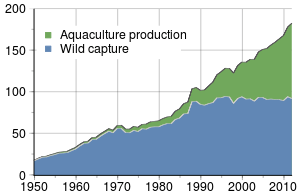
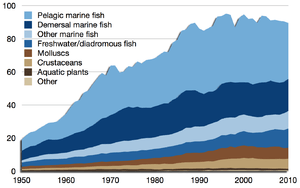
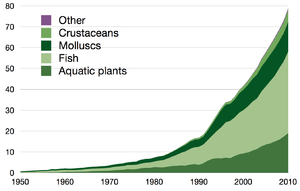

.png)

